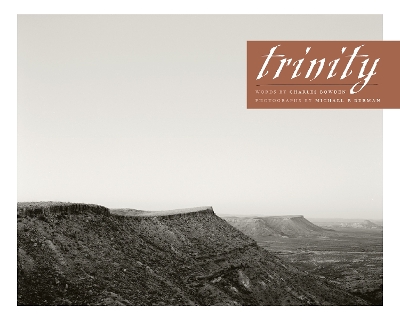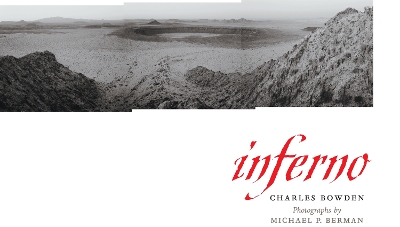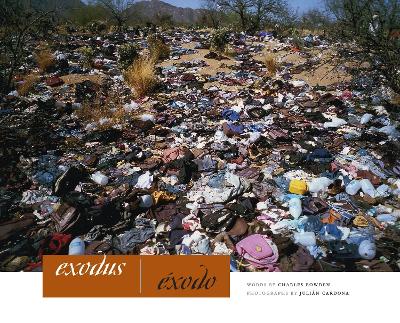Bill and Alice Wright Photography
3 total works
The Southwestern desert—that tumultuous "zone claimed by two nations, and controlled by no one"—is Charles Bowden's home and enduring passion. In acclaimed books ranging from A Shadow in the City: Confessions of an Undercover Drug Warrior and Down by the River: Drugs, Money, Murder, and Family to Inferno and Exodus/Éxodo, Bowden has written eloquently about issues that plague the border region—the smuggling of drugs and people and the violence that accompanies it, the rape of the environment and the greed that drives it. Completing a trilogy that includes Inferno and Exodus/Éxodo, Bowden looks back in Trinity across centuries of human history in the border region to offer his most encompassing and damning indictment of "the murder of the earth all around me."
Sparing no one, Bowden recounts how everyone who has laid claim to the Southwestern desert—Native Americans, Spain, Mexico, and the United States—has attempted to control and domesticate this ecologically fragile region, often with devastating consequences. He reserves special scorn for the U.S. government, whose attempts at control have provoked consequences ranging from the massive land grab of the Mexican War in the nineteenth century, to the nuclear fallout of the first atomic bomb test in the twentieth century, to the police state that is currently growing up around attempts to seal the border and fight terrorism. Providing a stunning visual counterpoint to Bowden's words, Michael Berman's photographs of the desert reveal both its harsh beauty and the scars it bears after centuries of human abuse.
Bowden's clearest warning yet about the perils facing the desert he calls home, Trinity confirms that, in his words, "the [border] zone is a laboratory where the delusions of life—economic, religious, military, foreign policy, biological, and agricultural—can be tested. This time the edge is the center, this time the edge is the face of the future."
One of America's foremost environmental writers joins with an acclaimed landscape photographer to create an unmatched portrait of the Sonoran Desert in all its harsh beauty.
Winner, Southwest Book Award, Border Regional Library Association, 2007
Runner-up, Honorable Mention, Orion Book Award, 2007
Charles Bowden has been an outspoken advocate for the desert Southwest since the 1970s. Recently his activism helped persuade the U.S. government to create the Sonoran Desert National Monument in southern Arizona. But in working for environmental preservation, Bowden refuses to be one who "outline[s] something straightforward, a manifesto with clear rules and a set of plans for others to follow." In this deeply personal book, he brings the Sonoran Desert alive, not as a place where well-meaning people can go to enjoy "nature," but as a raw reality that defies bureaucratic and even literary attempts to define it, that can only be experienced through the senses.
Inferno burns with Charles Bowden's passion for the desert he calls home. "I want to eat the dirt and lick the rock. Or leave the shade for the sun and feel the burning. I know I don't belong here. But this is the only place I belong," he says. His vivid descriptions, complemented by Michael Berman's acutely observed photographs of the Sonoran Desert, make readers feel the heat and smell the dryness, see the colors in earth and sky, and hear the singing of dry bones across the parched ground.
Written as "an antibiotic" during the time Bowden was lobbying the government to create the Sonoran Desert National Monument, Inferno repudiates both the propaganda and the lyricism of contemporary nature writing. Instead, it persuades us that "we need these places not to remember our better selves or our natural self or our spiritual self. We need these places to taste what we fear and devour what we are. We need these places to be animals because unless we are animals we are nothing at all. That is the price of being a civilized dude."
These harsh realities constitute the heart of Exodus/Éxodo, a powerful collaboration between writer Charles Bowden and photographer Julián Cardona that puts a human face on the issue of illegal immigration. Expanding on their award-winning 2006 Mother Jones article titled "Exodus: Border-Crossers Forge a New America," Bowden and Cardona take us to border towns, in which impoverished men and women hire "coyotes" to get them across the line; to Ciudad Juárez, where hundreds of young women maquiladora workers have been murdered and their families still seek justice; to Minutemen camps along the border, where citizen vigilantes keep watch; to New Orleans, North Carolina, and California, where migrants find back-breaking work in construction, agriculture, and other industries; to protest marches, as immigrants assert their right to stay in the United States; and to villages in Mexico, in which remitted dollars are building homes as lavish as the dreams that fuel the migrations.


